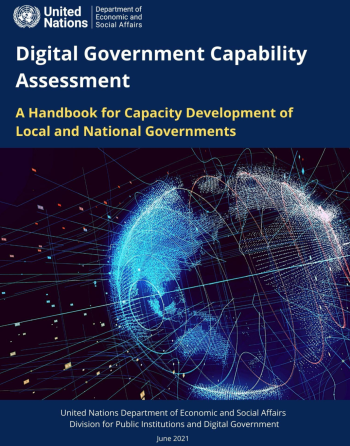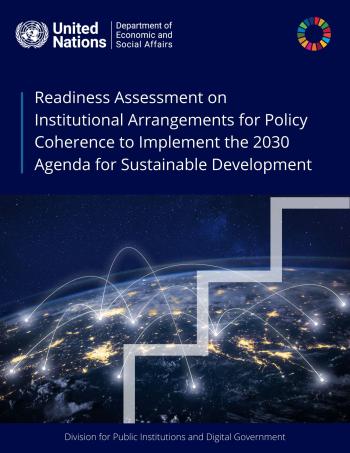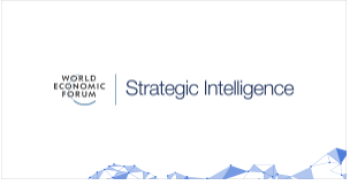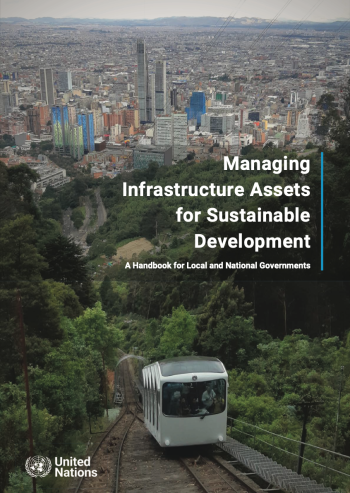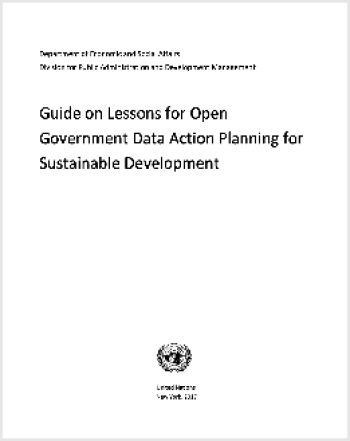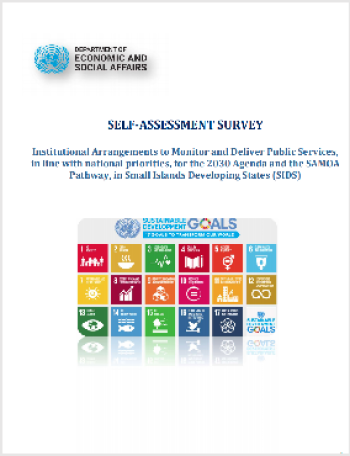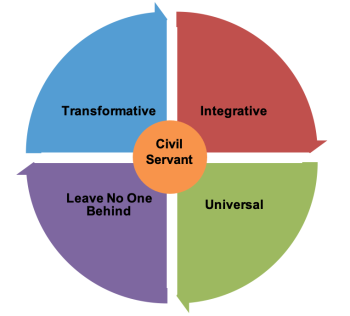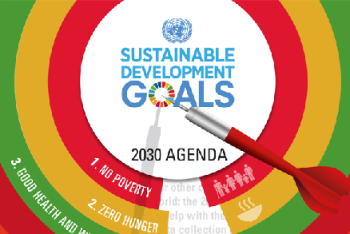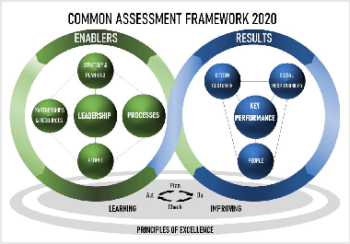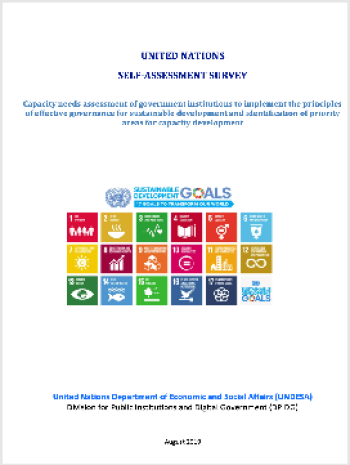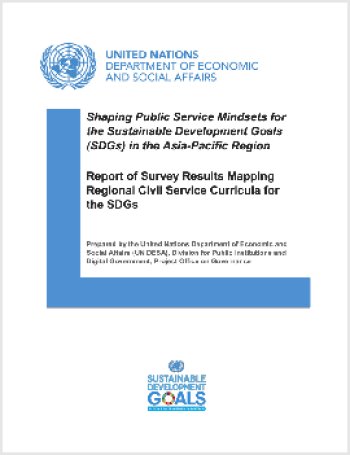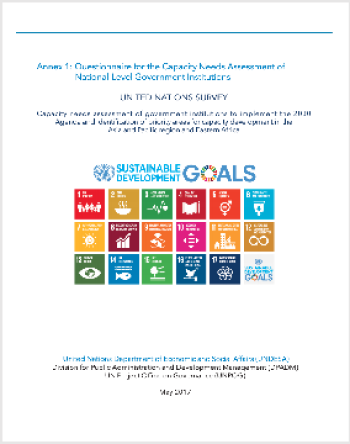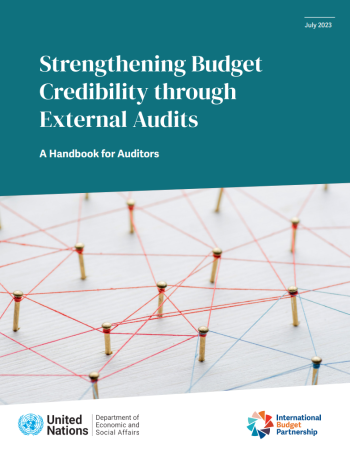Guidelines, Handbooks, Manuals and Self-Assessment Tools
Digital Government Capability Assessment
The Digital Government Capability Assessment (DGCA) is a six-dimension framework of enablers to engage governments in discussions towards digital government transformation. Considering that digital government requires a multifaceted response from governments, the dimensions of the DGCA contain various statements which could guide governments in understanding gaps and policy entry points. This tool can be used at the inter-institutional level as part of a national exercise or as an international comparative exchange between different countries at the regional or global level.
June 2021 | Self - Assessment Tool | Digital Government | English | Global
Contributed by UN DESA/DPIDG
Readiness Assessment on Institutional Arrangements for Policy Coherence to Implement the 2030 Agenda for Sustainable Development
The questionnaire is a tool that contains questions to facilitate a participatory dialogue process among national ministries/agencies (and sub-national levels of government). The assessment is composed of 9 building blocks, which together give an indication of whether and to what extent a government agency has in place mechanisms that effectively enhance institutional arrangements for policy coherence to implement the sustainable development goals.
2021 | Self - Assessment Tool | Governance and Public Institutions | English | Global
Contributed by UN DESA/DPIDG
Strategic Intelligence
Strategic insights and contextual intelligence from the World Economic Forum. Explore and monitor the issues and forces driving transformational change across economies, industries and systems.
2021 | Self-Assessment Tool | Innovation and Service Delivery| English | Global
Contributed by WEF
Managing Infrastructure Assets for Sustainable Development: A Handbook for Local and National Governments
Public infrastructure assets are the foundation of national and local economies. They provide essential services to our citizens yet they are often mismanaged. This Handbook provides local and national governments with a set of practical tools to improve infrastructure asset management. This includes guidance on how to adapt these tools to the socioeconomic and environmental challenges of our time.
2021 | Handbook | Governance and Public Institutions | English | Global
Contributed by UN DESA/FFSDO and UNCDF
For any technical assistance, please click here
Guide on Lessons for Open Government Data Action Planning for Sustainable Development
The Guide on Lessons for Open Government Data (OGD) Action Planning for Sustainable Development contains hands-on and easy-to-use information of particular relevance to the work of government policy-makers and technology experts that wish to understand what OGD is; why governments could use OGD as a tool for supporting transparent, accountable and participatory governance for sustainable development; and how to assess, plan, implement and evaluate successful OGD initiatives and programmes.
March 2020 | Guideline | Participation and Accountability | English | Global
Contributed by UN DESA/DPIDG
Institutional Arrangements to Monitor and Deliver Public Services, in line with national priorities, for the 2030 Agenda and the SAMOA Pathway in Small Islands Developing States (SIDS)
This tool is an adaptation of the CD Self-Assessment on Principles and Strategies for Effective Governance. This Survey is not an evaluation. The results are used internally by countries and are not made public. The Survey helps gather information on steps taken by the ministries/departments and relevant organizations in SIDS to adapt the SDGs to national contexts, develop policies and action plans, mobilize and adapt their institutions, engage civil society, private sector, scientific community and people, as well as establish the framework for reviewing progress in the implementation of the SAMOA Pathway and the SDGs, in line with the national priorities.
January 2020 | Self - Assessment Tool | Innovation and Service Delivery | English | Global
Contributed by UN DESA/DPIDG and UN DESA/DSDG
Common Competency Framework for Implementing the SDGs
The UN DESA Competency Framework of Public Servants to Implement the SDGs are designed to advance achievement of all 17 Goals and 169 Targets of the 2030 Agenda. The competencies are based upon the key principles of the 2030 Agenda, which include transformation, integration, leaving no one behind and universality. These principles serve to guide public service values, mindsets, and competencies for strengthened performance measurement of civil service.
2020 | Self - Assessment Tool | Leadership and Public Servant’s Capacities | English | Global
Contributed by UN DESA/DPIDG
E-Handbook on SDG Framework and Metadata
E-Handbook on SDG Framework and Metadata provide Up- to-date information on the Sustainable Development indicators, their Tier category and the official metadata as per custodian agency. The E-Handbook is a resourceful tool that includes, where available, background information, country examples, and other resources to provide in-depth knowledge to data producers and users to improve collection, compilation and analysis.
2020 | Self-Assessment Tool | Participatory and Accountability | English | Middle East
Contributed by ESCWA
Common Assessment Framework (CAF)
CAF is a Quality Management self-assessment instrument which can relatively easily and in a fast manner, determine strengths, setting a basis for further institutional improvement. That is why it is a perfect diagnostic tool suitable as a quality assessment system for any type of public administration institution or its selected departments, regardless of EU, national, regional or local level.
2020 | Self - Assessment Tool | Governance and Public Institutions | English | Europe and Central Asia
Contributed by ReSPA
Capacity Needs Assessment of Government Institutions to Implement the Principles of Effective Governance for Sustainable Development and Identification of Priority Areas for Capacity Development
The Survey will help gather information on steps taken by countries to adapt the SDGs to national contexts, develop policies and action plans, mobilize and adapt their institutions, engage civil society, private sector, scientific community, and people, as well as establish the framework for reviewing progress in the implementation of the SDGs.
August 2019 | Self - Assessment Tool | Governance and Public Institutions | English | Global
Contributed by UN DESA/DPIDG
Final Report of Asia-Pacific Survey PA Schools for SDGs
UN DESA/DPIDG shared a survey with 23 national schools in the Asia-Pacific region in April 2018 to develop a baseline and map where the region is on training public administration for the 2030 Agenda for Sustainable Development. Similar mappings and baseline research DPIDG also undertaken in Africa and Latin America as regional networks are developed for this new global initiative. Data was collected to compare good practices and lessons learned, while shaping greater knowledge exchange in the region and strengthening public administration institutions to achieve the SDGs.
22 October 2018 | Self - Assessment Tool | Governance and Public Institutions | English | Global
Contributed by UN DESA/DPIDG/UNPOG
Capacity Needs Assessment of Government Institutions to Implement the 2030 Agenda for Sustainable Development and Identification of Priority Areas for Capacity Development in the Asia and Pacific Region and Eastern Africa
The main objective of the Capacity Needs Assessment is to assess public institutions’ capacity needs and priorities in implementing the 2030 Agenda for Sustainable Development in 47 Member States in Asia and the Pacific and Eastern Africa with focus on three group of countries: Small Island Developing States (SIDS), Least Developed Countries (LDCs)/Landlocked Developing Countries (LLDCs) and Low- and Middle-Income Countries (MICs). This exercise helps identify institutional capacity gaps, challenges and capacity needs in developing countries for achieving the 2030 Agenda and implementing the Sustainable Development Goals (SDGs).
May 2017 | Self - Assessment Tool | Governance and Public Institutions | English | Global
Contributed by UN DESA/DPIDG/UNPOG
Open Government Data (OGD) Readiness Assessment
The OGD Readiness Assessment was created to assist Governments in assessing how prepared a country is to the adoption and implementation of an OGD initiative. Specifically, the assessment helps governments to identify specific areas for improvements and potential niches for the initial start up of OGD initiatives. Based on key factors the assessment can assist governments in adjusting their respective plans to consolidate strengths and address weaknesses.
Self - Assessment Tool | Participation and Accountability | English | Global
Contributed by UN DESA/DPIDG
UN Competency Framework for Public Servants to Realize the Sustainable Development Goals
As the UN Competency Framework highlights, competencies are forward-looking, describing the skills and attributes officials need to build a new organizational culture and meet future challenges. However, they also provide a sound basis for consistent and objective performance standards by creating shared language about what is needed and expected. Equally, mindsets comprise the beliefs, worldview, and self-perception that matter for individuals as psychological factors governing how choices are made and habits are formed.
Guideline | Changing Mindset and Public Servants' Capacities | English | Global
Contributed by UN DESA/DPIDG
Handbook on Strengthening Resilience in Cities and Local Communities Through Innovation and Digital Government
This handbook introduces the reader to concepts, approaches, tools, exercises and innovative cases to Strengthen Resilience in Cities and Local Communities through Innovation and Digital Government. The handbook guides the reader towards roadmaps, policy toolkits, manuals and peer support to help cities and local communities better invest in practical action to strengthen resilience. This handbook builds on global good practices on effective governance. It also build on the Training Toolkit on “Risk-informed Governance and Innovative Technology for Disaster Risk Reduction and Resilience” as part of the Curriculum on Governance for the SDGs, which was developed by the United Nations Department of Economic and Social Affairs (UN DESA), Division for Public Institutions and Digital Government (DPIDG), through the UN Project Office on Governance (UNPOG). This handbook is part of a series of six succinct publications within UN DESA’s Curriculum on Governance for the SDGs designed to promote effective, accountable and inclusive public institutions.
Handbook | Local Governance | English | Global
Contributed by UN DESA/DPIDG/UNPOG
Handbook on Digital Transformation in Local Government
This handbook is one in a series on Innovative Local Governance for the Implementation of the Sustainable Development Goals developed by the United Nations Project Office on Governance (UNPOG) of the Division for Public Institutions and Digital Government (DPIDG) of the United Nations Department of Economic and Social Affairs (UN DESA), in collaboration with the Korea Research Institute for Local Administration (KRILA). The series includes six handbooks that aim to support local authorities and other stakeholders in developing the necessary knowledge, skills and capacities to implement the SDGs by introducing strategies, approaches and tools and by showcasing innovative country cases and experiences.
Handbook | Local Governance | English | Global
Contributed by UN DESA/DPIDG/UNPOG
Handbook on Effective National to Local Governance for Climate Change Mitigation and Adaptation
This handbook introduces the reader to concepts, approaches, tools, exercises and innovative cases relating to Climate Change Mitigation and Adaptation. The handbook guides the reader towards roadmaps, policy toolkits, manuals and peer support to help cities and local communities better invest in practical actions on climate change. This handbook builds on global good practice and the Training Toolkit on “Effective National to Local Public Governance for SDG Implementation." developed by UNPOG/DPIDG/UN DESA. This handbook is one in a Handbook Series on "Innovative Local Governance for the Implementation of the Sustainable Development Goals" developed by UNPOG/DPIDG.
Handbook | Local Governance | English | Global
Contributed by UN DESA/DPIDG/UNPOG
Handbook on Fostering Collaborative Public Administration for Local Governments
This handbook explains the concepts, attributes and approaches of collaborative administration and specifically introduces practical cases of collaborative public administration in local governments in the Republic of Korea. Collaborative public administration is recognized as a method that can effectively respond to complex and diverse administrative demands, but there are many obstacles in applying it on a practical level.
Handbook | Local Governance | English | Global
Contributed by UN DESA/DPIDG/UNPOG
Handbook on Promoting Local Innovation for Inclusion of People in Vulnerable Situations and Leaving No One Behind
This handbook on “Promoting Local Innovation for Inclusion of People in Vulnerable Situations and Leaving No One Behind” is part of the Handbook Series on “Innovative Local Governance for the Implementation of the Sustainable Development Goals”, a collaboration between the UN Project Office on Governance (UNPOG), an integral part of the Division for Public Institutions and Digital Government (DPIDG) of the UN Department of Economic and Social Affairs (UN DESA), and the Korea Research Institute for Local Administration (KRILA).
Handbook | Local Governance | English | Global
Contributed by UN DESA/DPIDG/UNPOG
Handbook on Social Value in Local Governments
This handbook furthers the discussion on the premise that social value is the main axis of the paradigm shift of local governments oriented towards traditional development administration. The handbook focuses on what should be done by local governments to spread social value, directly accommodating the demands of residents.
Handbook | Local Governance | English | Global
Contributed by UN DESA/DPIDG/UNPOG
Handbook on strengthening budget credibility through external audits
DPIDG/UN DESA is collaborating with the International Budget Partnership (IBP) to support Supreme Audit Institutions in conducting analyses of the credibility of government budgets through external audits (SDG16.6.1).“Strengthening Budget Credibility through External Audits: An Auditor’s Handbook” is the output of a two-year collaboration between Supreme Audit Institutions, civil society, international organizations, and other public finance experts. The handbook explores different approaches to auditing budget credibility. Drawing on SAIs’ experience in different regions, the result is a practical overview of existing and potential audit work that can contribute to improving budget credibility.
Handbook | Participation and Accountability | English | Global
Contributed by UN DESA/DPIDG
To find more Assessment Tools, please visit here
 Welcome to the United Nations
Welcome to the United Nations
